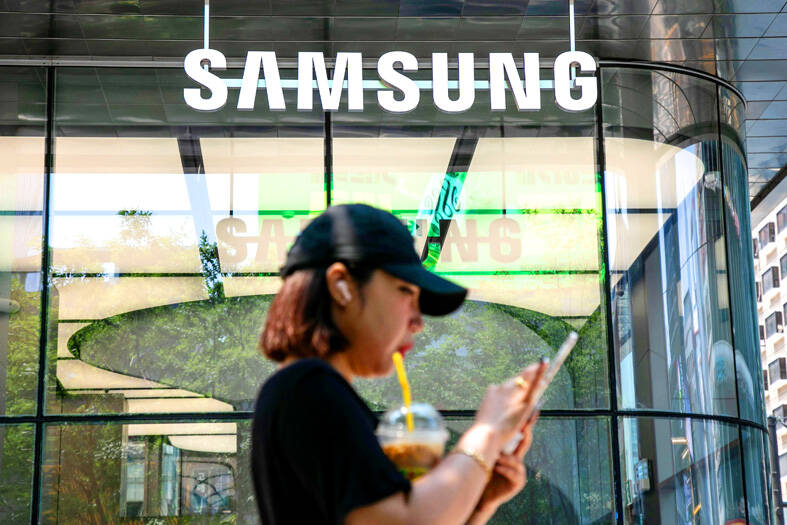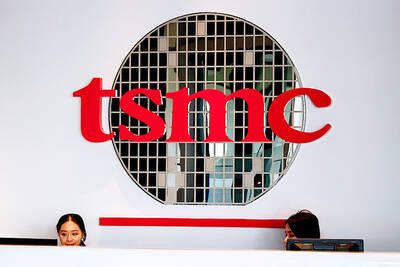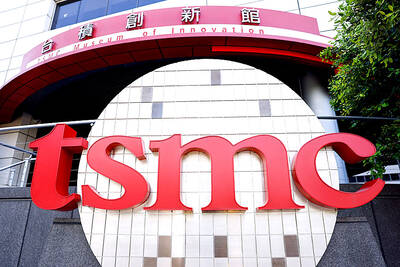A union representing tens of thousands of workers at South Korean tech giant Samsung Electronics Co yesterday said it would hold a three-day strike later this month after negotiations failed.
“Starting from July 8, we will stage a three-day general strike,” National Samsung Electronics Union vice president Lee Hyun-kuk said.
The union announced the strike late on Monday in a live YouTube broadcast, without providing the dates.

Photo: Bloomberg
The move follows a one-day walkout last month, the first such collective action at the company, which went decades without unionization.
Management at the company, the world’s biggest producer of memory chips, has been locked in negotiations with the union since January.
Workers have rejected the offer of a 5.1 percent pay hike, with the union having previously outlined demands including improvements to annual leave and transparent performance-based bonuses.
In calling for the strike, the union said that “management created this state” by failing to offer significant concessions.
“What will change if we do not act? Will you just watch and do nothing? Will you be a hidden slave or an active owner? Nothing will change if we do not act,” its statement said.
“All employees need to participate in the strike. Let’s step up and change it,” it said.
Samsung declined a request for comment.
Samsung Electronics avoided its employees unionizing for almost 50 years — sometimes adopting ferocious tactics, according to critics — while rising to become the world’s largest smartphone and semiconductor manufacturer.
Company founder Lee Byung-chul, who died in 1987, was adamantly opposed to unions, saying that he would never allow them “until I have dirt over my eyes.”
The first labor union at Samsung Electronics was formed in the late 2010s.

Chizuko Kimura has become the first female sushi chef in the world to win a Michelin star, fulfilling a promise she made to her dying husband to continue his legacy. The 54-year-old Japanese chef regained the Michelin star her late husband, Shunei Kimura, won three years ago for their Sushi Shunei restaurant in Paris. For Shunei Kimura, the star was a dream come true. However, the joy was short-lived. He died from cancer just three months later in June 2022. He was 65. The following year, the restaurant in the heart of Montmartre lost its star rating. Chizuko Kimura insisted that the new star is still down

While China’s leaders use their economic and political might to fight US President Donald Trump’s trade war “to the end,” its army of social media soldiers are embarking on a more humorous campaign online. Trump’s tariff blitz has seen Washington and Beijing impose eye-watering duties on imports from the other, fanning a standoff between the economic superpowers that has sparked global recession fears and sent markets into a tailspin. Trump says his policy is a response to years of being “ripped off” by other countries and aims to bring manufacturing to the US, forcing companies to employ US workers. However, China’s online warriors

Taiwan Semiconductor Manufacturing Co (TSMC, 台積電) listed the challenges of ensuring export control compliance by its customers, months after the company’s artificial intelligence (AI) silicon was found to have flowed to US-sanctioned Huawei Technologies Co (華為) via intermediaries. “TSMC’s role in the semiconductor supply chain inherently limits its visibility and information available to it regarding the downstream use or user of final products that incorporate semiconductors manufactured by it,” the Hsinchu-based company said in its latest annual report released on Friday. The world’s largest contract chipmaker said the constraint impedes its ability to prevent unintended end-uses of its semiconductors, as well

Taiwan Semiconductor Manufacturing Co (TSMC, 台積電) expects steady growth this year despite global economic uncertainty due to continued momentum from tech trends such as 5G, artificial intelligence (AI) and high-performance computing (HPC) applications. In the company’s annual shareholders’ report released on Thursday, TSMC chairman and CEO C.C. Wei (魏哲家) said the company is well-positioned to meet market demand with its differentiated technology platforms. The company’s 2-nanometer process is on track for volume production in the second half of this year, while its next-generation nanosheet-based A16 process, aimed at HPC applications, is scheduled for mass production late next year, Wei said. Advanced technologies —